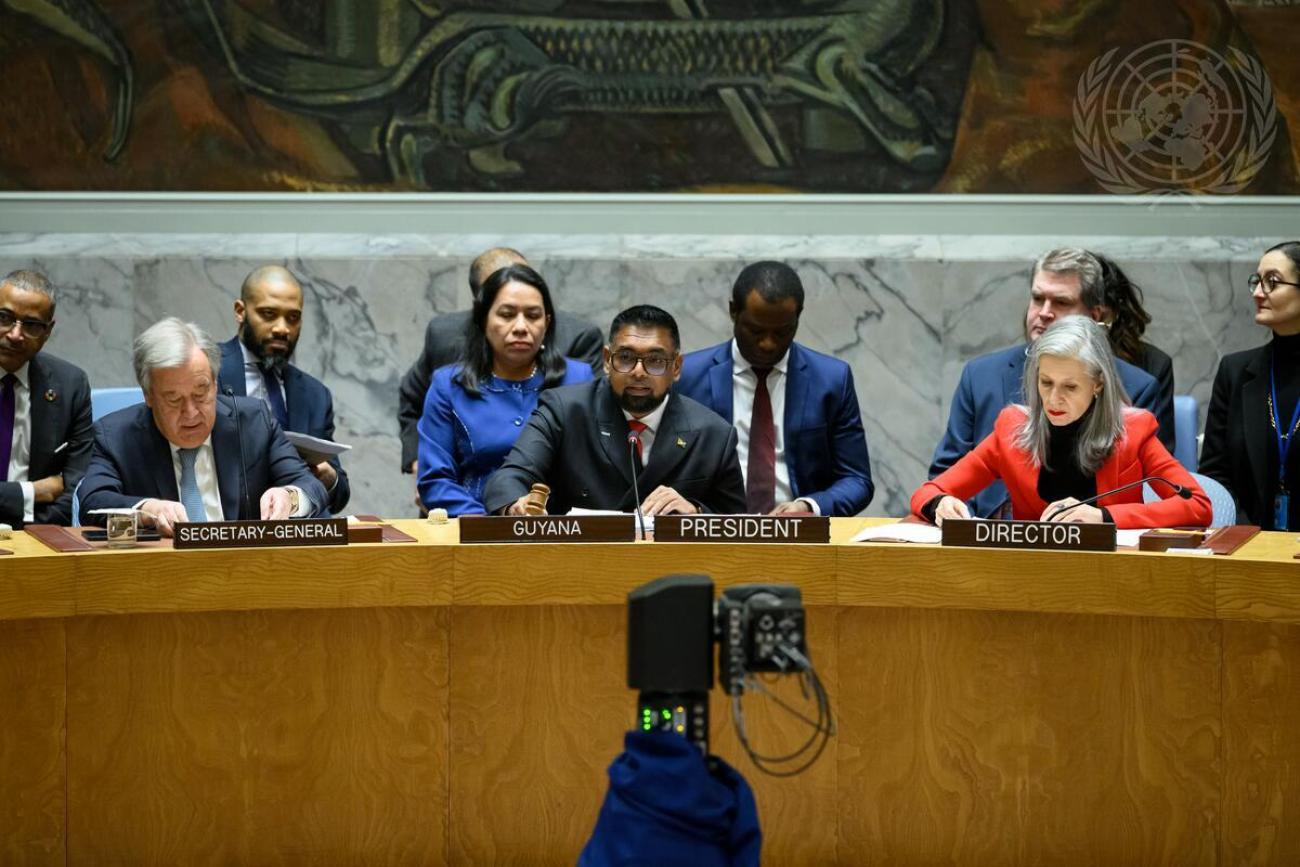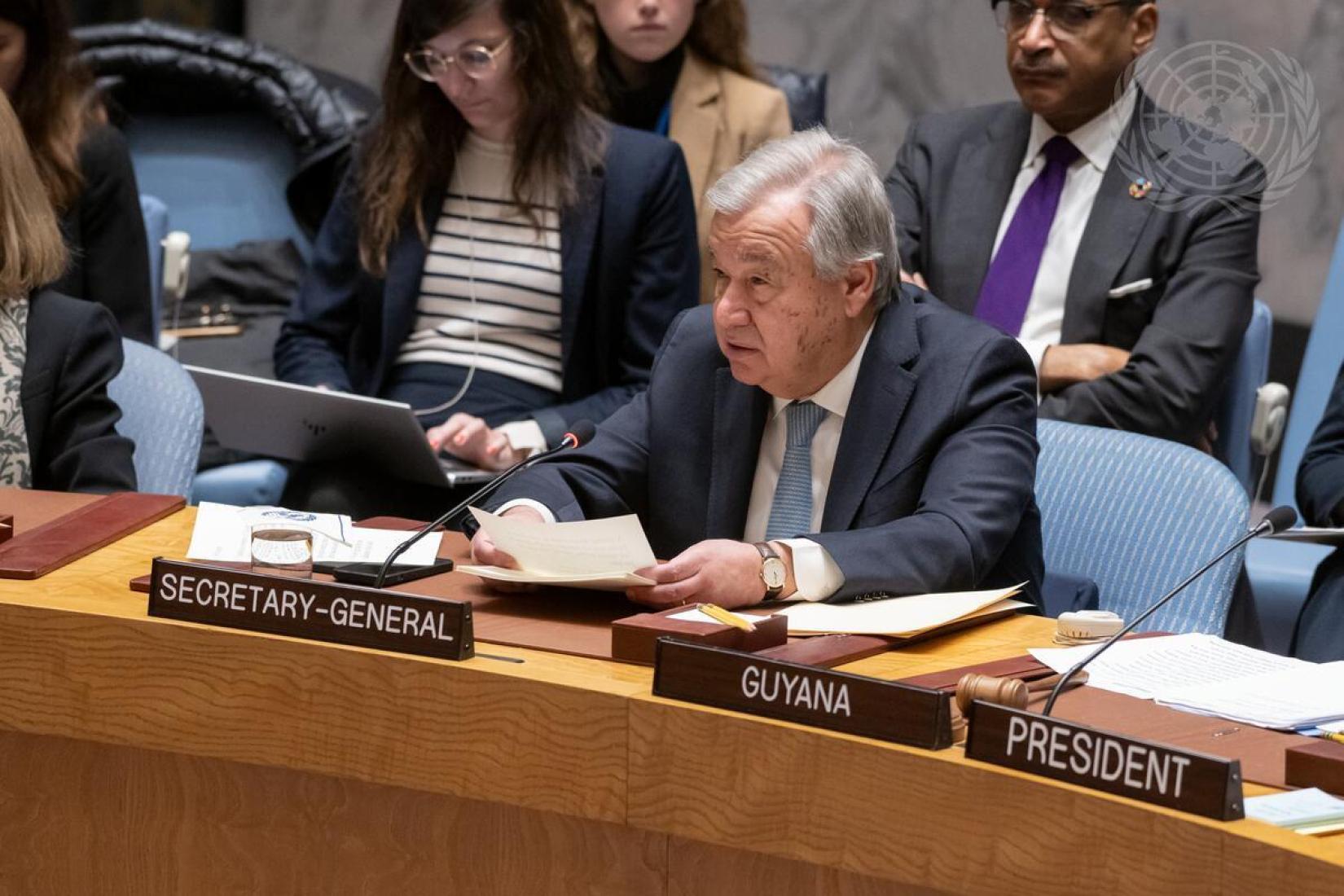UN Security Council debate urges bold action to address damaging effect of climate crisis, food insecurity on vulnerable, conflict-affected countries

President Mohamed Irfaan Ali of Guyana chaired a high-level open debate on climate change and food insecurity at the UN Security Council in New York.
The UN Security Council concluded its 13 October 2024 open debate on climate change and food insecurity, with speakers calling for urgent action to address the profound impact of these escalating crises — particularly on vulnerable and conflict-affected nations. The debate was chaired by President Mohamed Irfaan Ali of Guyana whose country is currently serving a two-year term as non-permanent representative and holds the rotating Presidency of the chamber for the month of February 2024.
In his statement to the Council, Guyana’s President highlighted the multi-directionality of climate-food-conflict links.
UN Secretary-General António Guterres delivered remarks, citing climate and conflict as "the main causes of acute food insecurity for almost 174 million people in 2022". He warned the two often collide to hit communities with a double blow.
Where wars rage, hunger reigns – whether due to displacement of people, destruction of agriculture, damage to infrastructure, or deliberate policies of denial. Meanwhile, climate chaos is imperilling food production the world over. Floods and droughts destroy crops, ocean changes disrupt fishing, rising seas degrade land and freshwater, and shifting weather patterns ruin harvests and spawn pests.

Simon Stiell of Grenada, Executive Secretary of the United Nations Framework Convention on Climate Change (UNFCCC), highlighted solutions, stating, "rapid sustained action to cut greenhouse gas emissions and to increase resilience is needed now to help stop both from spiralling out of control."
More Debate Highlights
Among the 88 speakers who addressed the Council during the debate, the representative of the Maldives said that for small island developing States — the first and hardest hit by its impact — “climate change is a humanitarian issue as much as it is a security issue”. Unprecedented tidal waves, coastal erosion and increased frequency of natural disasters directly impact the livelihoods of its people. Against this backdrop, he underscored the need to strengthen climate mitigation and adaptation efforts, and to address the root causes of the ongoing crises and conflicts.
Tonga’s representative, speaking for the Pacific Islands Forum, said that climate change is now the greatest threat to livelihoods for small island developing States — and accordingly deserves a standing consideration in the Council. He warned that land will become uninhabitable long before it goes underwater. Climate change could ignite social unrest, exacerbate tensions and force populations to migrate, destabilising the Pacific region — where the reality of climate-related displacement is evident — and beyond.
The delegate for Haiti — where more than 44 per cent of the population is suffering “acute food insecurity” — called on international partners to further support national production and provide farmers with agricultural equipment, seeds, fertiliser and support for agricultural cooperatives. In addition, support for rebuilding infrastructure and irrigation channels will help reduce the level of food insecurity and address unemployment.
“Addressing the root causes of conflict cannot be overemphasised,” added Ethiopia’s delegate, stressing that eradicating extreme poverty by accelerating sustainable growth and development is extremely crucial. Climate-driven food insecurity will pose a serious challenge to humanity unless global warming is addressed, he warned. Calling for greater national ambition to achieve the goal of limiting global temperature rise to 1.5 degrees Celsius above pre-industrial levels and to fulfil climate financing commitments, he said bolstering agricultural finance to enhance production and productivity for climate action and food security is vital.
The representative of Nauru, speaking on behalf of the Group of Friends on Climate and Security, urged all relevant UN peacekeeping and special political missions to systematically incorporate climate change and disaster risk into their mandates, while encouraging all missions to reduce their environmental footprint. She urged the Secretary-General to also provide regular monitoring and reporting to the Council on the peace and security impacts of climate change. She called for climate, peace and security advisers to be appointed to relevant UN missions and regional and subregional organisations, within existing resources. She also called for appointing a special representative on the matter to enhance coordination between relevant UN entities and improve the Organisation’s ability to address climate-related security risks.
Offering the perspective of a humanitarian organisation, the Permanent Observer for the International Committee of the Red Cross (ICRC) stressed that climate action in conflict settings is particularly weak due to the challenges attached to enabling comprehensive climate adaption in unstable environments. “This needs to urgently change,” she said, pointing out that a better respect for international humanitarian law in armed conflicts will reduce the cost of war.
To reduce damage inflicted on the environment, she called for an urgent shift in how wars are fought. International humanitarian law sets legal limits on the damage that warring parties can inflict on the environment. Ensuring respect for these rules can limit environmental degradation and thus reduce the harmful consequences it generates, including food insecurity, she said. It is also crucial, she said, to ensure food provision and access to essential resources throughout conflict. “Even after the guns go silent, impacted regions struggle to recover from the devastating legacy of wars,” she said, adding, that in many places, rebuilding livelihoods is hampered by unexploded ordnance, crippled economies and repeated climate hardships.
..................................................................
Elements of this story have been adapted from a UN Security Council Press Release.



